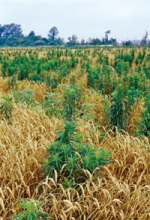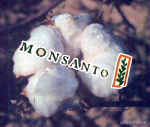Articles
01.12.2014 | permalink
Introducing GMO to farmers in Kenya would be jumping the gun
Kenya told to defer introduction of GM crops
Kenya has been asked to delay introduction of genetically modified (GM) crops and boost the use of conventional means of food production.
Sylvia Mwichuli, a director at Alliance for a Green Revolution in Africa, said the East African nation should not be in a hurry to introduce GM crops because the current means of food production are under-utilised.
“We should fully exploit the science that we have before introducing new technologies that we cannot fully handle,” she said on Tuesday.
Mwichuli noted that Kenya’s farmers barely know innovative methods of food production available in the country, the reason why they do not use them.
“Introducing GM to them would be jumping the gun. The technology is not the panacea to food insecurity. There are many more beneficial technologies in Kenya that have not been spread to farmers. That is where we should start with,” she said.
- Kenya told to defer introduction of GM crops
- Son of Gates Foundation donor criticises Foundation's approach to Africa
- Prof Akosa lambasts Kofi Annan for promoting GMO case | General News 2014-11-09
- Standard Digital News : : Health - Learn from other countries failures on GMO, Africa warned
- Banning of GMOs in Kenya - YouTube
28.11.2014 | permalink
Norwegian food authority stops approving antibiotic marker gene-containing GMOs in fish feed
GMWatch: 28 November 2014
Move comes amid concerns about rise in antibiotic-resistant infections
According to the Norwegian Biotechnology Advisory Board, the Norwegian Food Safety Authority has stopped approving (on a yearly basis) GMOs for use in fish feed that contain genes coding for antibiotic resistance. According to the Advisory Board, this applies to 8 out of 19 GMOs which the fish feed industry had previously been given permission to use since 2008.
An article on the website of the Norwegian Biotechnology Advisory Board reports:
"The fear is that genes in the GM feed that code for antibiotic resistance may be taken up by various bacteria in the soil in the country where the GMO is produced, in the feed production chain, or in the gut of the fish. Scientists know little about to what extent, or if, this happens with genes that are inserted via genetic modification, but few would deny that it could happen. If the genes first have entered into a bacterium [during the genetic engineering process], they may quickly spread further."
28.11.2014 | permalink
Oregon's 'Measure 92' GMO labeling: Oregon counties have until Dec. 12 to recount

Oregon's county clerks have been officially ordered to conduct a hand recount of votes for and against GMO labeling Measure 92 by December 12.
Secretary of State Kate Brown announced late Tuesday that, as expected, the certified results of Measure 92 are so close they require an automatic hand recount.
County elections officials now need to take up that task, with the state paying the cost.
- Measure 92 GMO recount: Oregon counties have until Dec. 12 to recheck votes | OregonLive.com
- A whisker from victory! Oregon GMO vote goes to a recount - The Ecologist
- Vote tally too close, recount ordered on Oregon GMO labeling | Reuters
- Measure 92: Dec 12 deadline for Oregon GMO labeling vote recount
- Yes on 92 campaign: Recount! | Oregon Right to Know
26.11.2014 | permalink
Problems with glyphosate-resistant weed in GMO cultivated countries

Argentina confirmed that Digitaria insularis is resistant to glyphosate and has invaded crops in the Northwest and Northeast regions of the country, and in the south of the Santa Fe province. This weed was previously classified on an yellow alert for suspected resistance to glyphosate.
The dose-response test to verify resistance was done by the Center of Herbicides Assessment of the Agrobiotechnology Institute of Rosario. The resistance index was 11.8, which means that a dose of 12 times higher would be required to control the Digitaria insularis comparing to non-resistant ones.
Both Paraguay and Brazil already had identified the Digitaria insularis biotypes resistant to glyphosate in 2005 and 2008, respectively. Currently, this specie is one of the major problems in both countries, and spreads rapidly in Brazil.
- New glyphosate-resistant weed is detected in Argentina - AgroPages.com
- Confirmed and suspect resistant weeds growing - Agri-View
- Farmers' war on weeds threatens neighboring vineyards - Houston Chronicle
- Impacts of genetically engineered crops on pesticide use in the U.S. -- the first sixteen years
- Field of weeds: Could agriculture crisis crop up from herbicide resistance? | PBS NewsHour
24.11.2014 | permalink
Rising suicide rate for Indian farmers blamed on GMO seeds

Monsanto, which has just paid out $2.4 million to US farmers, settling one of many lawsuits it’s been involved in worldwide, is also facing accusations that its seeds are to blame for a spike in suicides by India farmers.
The accusations have not transformed into legal action so far, but criticism of Monsanto has been mounting, blaming the giant company for contributing to over 290,000 suicides by Indian farmers over the last 20 years.
The author of a documentary on Indian farmers’ suicides, Alakananda Nag, who has interviewed dozens of the relatives of those who have taken their lives, links the rise in the suicide rate to the use of GMO seeds. She believes small farms are particularly vulnerable.
“The large farms certainly have the funds to support themselves and get on, but the smaller ones are really ones that suffer the most,” Nag told RT. “Monsanto definitely has a very big hand to play. A few years ago it was illegal to grow GMO crops in India. It’s not like the suicide did not exist back then. It did, but I think there was definitely a sharp rise in the [suicide] numbers once [GMOs] were allowed.”
The Center for Human Rights and Global Justice has estimated that in 2009 alone 17,638 Indian farmers committed suicide, or one suicide every 30 minutes.
Farmers’ widows, such as Savithri Devi from India’s southern state of Telangana, explain just how tough things can get for those trying to grow enough crops to earn a living.
“[My husband] initially put a bore well, then started cultivation, but we didn’t get enough water from the bore well and there were no rains, too,” Devi told RT. “So he again tried to deepen the bore well, but it didn’t work. So he borrowed money. His depression eventually led him to committing suicide. He drank pesticide and died.”
The legalization of GMO in 2002 has only added to the stress experienced by Indian farmers, according to the head of the Council for Responsible Genetics, Sheldon Krimsky.
- Rising suicide rate for Indian farmers blamed on GMO seeds
- Farmer Suicides in India | CHRGJ
- Monsanto BT Cotton and Indian Farmers - Vandana Shiva - How Monsanto Destroys Farming - YouTube
- From Seeds of Suicide to Seeds of Hope: Why Are Indian Farmers Committing Suicide and How Can We Stop This Tragedy? | Vandana Shiva
- Council for Responsible Genetics: GeneWatchVolume 26 Issue 1 Genetics in Agriculture
- Picking Cotton: The choice between organic and genetically-engineered cotton for farmers in South India | Greenpeace India
21.11.2014 | permalink
Success Stories: Non-GMO Project in USA and the Swiss Soy Network

The Latest News from ProTerra and the Industry
Non-GMO Project Gains Importance In the USA
Non GMO project Concerns about genetically modified organisms in food and agriculture is often treated as a specific concern to consumers in European markets only. However, reviewing the on-going negotiations between the US and the EU, it is interesting to see the rising number of concerned American consumers who are asking for GM-labelling and are involved in the Non-GMO project. The non-GMO Project is organised as a not-profit organisation, offering third party verification and labelling of Non-GMO products. Verification of non-GMO Products is based on a detailed Standard, and is similar to the Standard of VLOG in Germany, and ARGE Gentechnik-frei in Austria.
(.....)
Success Story – The Swiss Soy Network
Switzerland plays a minor role in the global soy business; Swiss soybean production counts for only 0.001 percent of global harvest and Switzerland buys around 0.4% of the traded soymeal worldwide. However, the country has contributed considerably to alleviate the negative consequences of soy production.
The success factors for this result are:
- Purchasing of responsible Non-GMO soy needs a long-term commitment between all players in the value chain. Long lasting relationships, contracts, policies and strategies for sustainability are a pre-condition for the functioning of the network to achieve common goals.
- The network follows a pragmatic approach based on existing Standards such as Bio Suisse, ProTerra, RTRS Non-GMO and Danube Soy.
- Because no separated flow of goods was needed and the import of responsible soy had risen slowly and continuously year by year, the consumers never faced a price increase for Swiss meat, egg and milk.
- The Latest News from ProTerra and the Industry
- Non-GMO Project Standard | The Non-GMO Project
- Soy Network Switzerland
- CERT ID Non-GMO standard
- Danube Soya 2/2014
- VLOG - Association Food without Genetic Engineering
- Certification schemes (RTRS and ProTerra) in Brazilian soy
- ProTerra Foundation is revising its Standard to make it stronger and simpler, for a greater impact
20.11.2014 | permalink
ADM sued Syngenta over sales of a GMO corn

Nov 19 (Reuters) - Archer Daniels Midland Co sued seed company Syngenta AG on Wednesday over sales of a genetically modified corn variety not approved for import by China, joining more than 100 farmers and exporters in pursuing damages from the Swiss-based company. The lawsuit alleges that Syngenta commercialized the MIR162 corn variety, also known as Agrisure Viptera, without creating an effective stewardship program to ensure the grain would not be shipped to markets that have not approved it. China has over the past year rejected shipments of more than 1 million tonnes of U.S. corn and corn products because they contained MIR162 grain. The variety, planted on about 3 percent of U.S. corn acres during the past two years, can be found throughout the American supply chain because it has not been segregated from other varieties since its launch in 2011.
- ADM sues Syngenta over rejections of GMO corn by China | Reuters
- ADM Sues Syngenta Over Genetically Engineered Corn By Dow Jones Business News
- Cargill bars Syngenta corn variety at US wet mills | Reuters
- Syngenta lawsuit against Bunge over GMO corn revived on appeal | Reuters
- Syngenta Seeds, Inc. v. Bunge North America, Inc.
- Syngenta GMO Corn Seed Lawsuit | Syngenta GMO Corn Class Action Lawsuit | The Oliver Law Group
18.11.2014 | permalink
Contamination from GE crops does happen: nearly 400 incidents since GE crops were introduced

Blogpost by Janet Cotter and Becky Price - 12 November, 2014
Genetically engineered (GE - also called genetically modified, GM) crops raise many concerns, particularly for the environment. One of the main concerns for consumers, farmers and traders is contamination from GE crops. Now, a comprehensive review of recorded GE contamination incidents has been published in a scientific journal by Greenpeace and GeneWatch.
GeneWatch and Greenpeace maintain a website, the GM Contamination Register, that records incidents of contamination caused by GE crops dating back to 1997 (just after GE crops were first commercially grown). By the end of 2013, nearly 400 incidents were recorded. The review analyses these incidents by crop and by country. It reveals some interesting patterns of GE contamination and the limitations to what we know about how contamination happens and how it is detected.
- Contamination from GE crops does happen: nearly 400 incidents since GE crops were introduced | Greenpeace International
- The GM Contamination Register: a review of recorded contamination incidents associated with genetically modified organisms (GMOs), 1997–2013 - Springer
- GM Contamination Register
- GMWatch: GM contamination cannot be contained – new paper
- GeneWatch UK
17.11.2014 | permalink
Monsanto to pay $2.4 million to farmers in GMO wheat dispute

Monsanto agreed to pay almost $2.4 million compensation to U.S. wheat farmers, who suffered economic losses after unlicensed genetically modified (GM) wheat was found in Oregon last year. On Wednesday, Monsanto announced that it had entered into a settlement agreement with farmers in the States of Washington, Oregon and Idaho who sued the seed company over market disruption. In May 2013, unapproved wheat, genetically engineered to withstand Roundup Ready herbicide, was discovered growing on a farm in Eastern Oregon. In response, Japan and South Korea temporarily stopped importing U.S. wheat due to fears the unapproved GM wheat might have contaminated U.S. wheat supplies. The settlement includes paying $2.1 million into a fund for farmers in the states of Washington, Oregon and Idaho, who sold “soft white wheat” between May and November of 2013. A further $250,000 will go to different wheat growers’ associations. Monsanto will also pay the legal costs to farmers who were pursuing legal action against them. However, the company did not admit liability and said the agreement only resolves claims associated with the white wheat variety. At least three class action lawsuits have now be dismissed as part of the settlement. It is still unclear how the GM wheat appeared in the Oregon field in the first place. Monsanto’s GM wheat was never approved by U.S. regulators and the company said it stopped testing in Oregon over a decade ago. The U.S. Department of Agriculture said in September there had been a second discovery of unapproved Monsanto wheat at a Montana State University research facility, where field trials were conducted between 2000 and 2003. Right now, there is no commercially approved genetically modified wheat worldwide. In 2004, Monsanto withdrew its application for the approval of herbicide resistant GM wheat.
17.11.2014 | permalink
Market speaks louder than science: GMO-free animals a good business model
Cattle rancher Steve Kopp is no purist when it comes to feed. Still, at his 70-acre Silver Springs Ranch in Martinez, his organic cattle forage across pastures. “Cattle can be raised properly on grain,” Kopp said. “And we have talked about using genetically engineered feed in the past, but I see our clientele as our friends and family and we want them to have the best meat possible.” A few studies have concluded that genetically engineered food can cause health problems in animals. Some have been vilified by the scientific community, such as a 2012 study by French scientist Gilles-Eric Séralini. That study, published in the journal Food and Chemical Toxicology, found that rats fed genetically modified corn grew tumors. The scientific community widely criticized the study for using a type of rat susceptible to tumor growth. The research was withdrawn a year later and republished in a less prestigious science journal. Some scientists claim research that finds any effect of genetically engineered food is quickly vilified or put through uncharacteristic scrutiny, and that lack of labeling makes it difficult to study the effect of GMO food on humans.
- Market speaks louder than science: GMO-free animals a good business model | The Sacramento Bee
- Bauman’s Cedar Valley Farms hopes to build GMO-free feed hub through contest | The Kansas City Star
- Non-GMO Animal Feed Resource Guide | Northeast Organic Farming Association: Massachusetts Chapter
- Guidelines | The Non-GMO Project
- Eurofins GMO Testing
- GMO Testing|Animal Feed, Speciation Tests|Genetic ID
- GMO testing
